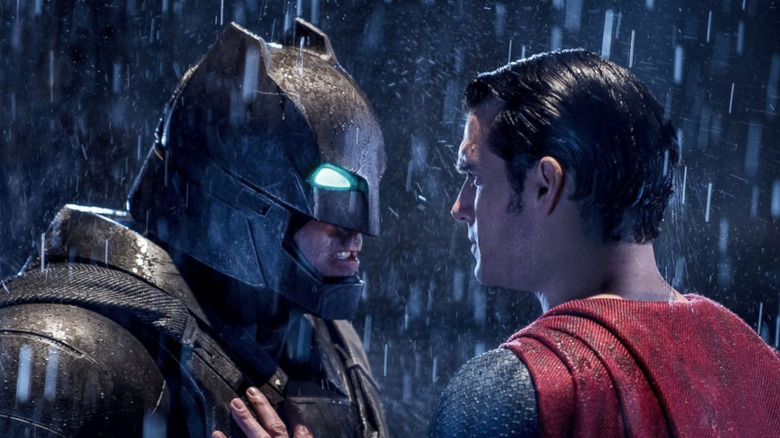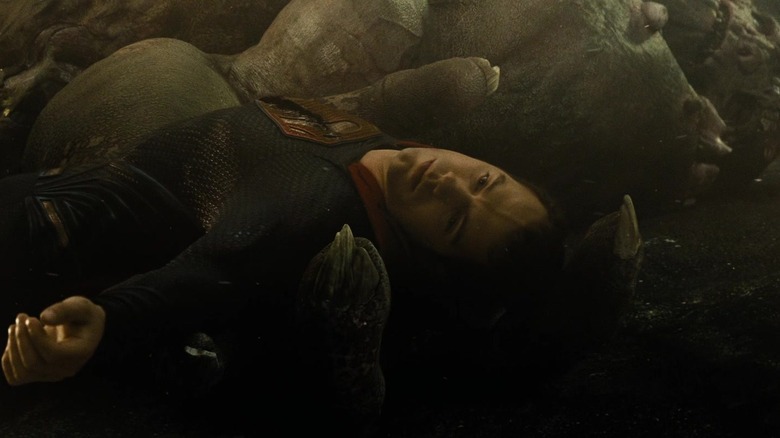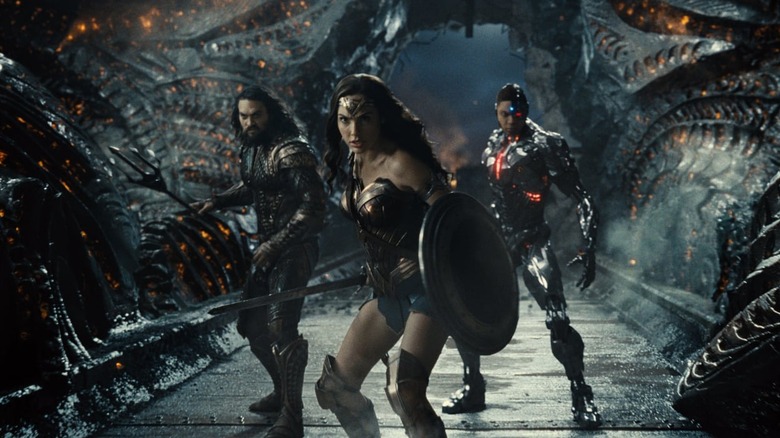The Downfall Of Zack Snyder's DC Extended Universe Can Be Tracked Back To One Moment
We are about to enter a new era for DC movies, with James Gunn and Peter Safran kicking off their DC Universe with a new "Superman" film (as is tradition for DC). Reactions so far have been mostly positive, offering fans a sliver of hope that we'll finally get a shared cinematic universe based on DC Comics characters that can last for more than a handful of years.
The last time Warner Bros. tried that, of course, was with Zack Snyder's DC Extended Universe, itself DC's response to the pop culture-redefining, box office smash-hit, water cooler conversation overlord that was the Marvel Cinematic Universe in the 2010s. In truth, the DCEU crashed and burned virtually as soon as it launched, only barely becoming less of a joke than the Dark Universe. Indeed, after just five movies, interconnectivity was largely abandoned in favor of making fun but standalone films, with the universe at large making to leave any sort of meaningful impact.
There are many reasons why the DCEU failed, most of which were due to behind-the-scenes power struggles and a series of commercial and/or critical flops. Even when the DCEU produced some big hits, like the first "Aquaman" movie (a zany film that, among other things, features a truly ridiculous cover of Toto's "Africa" by Pitbull), they weren't enough to sustain a cinematic universe.
Still, regardless of the off-screen controversies and hate-led online campaigns of harassment, you can actually pinpoint the moment when the DCEU doomed itself to a premature demise. It was back when Superman (Henry Cavill) died in 2016's "Batman V Superman: Dawn of Justice."
Killing Superman ended any chance of the DCEU becoming functional
Let's get something out of the way here first: "Man of Steel," Snyder's first entry in the DCEU, is pretty good. Sure, it's got huge flaws, but it's nevertheless an interesting take on Superman with some great action and stunning imagery. Likewise, "Batman V Superman" does have its moments, like the opening scene where we see the destruction of Metropolis from Bruce Wayne's (Ben Affleck) perspective (or the kick-ass warehouse fight). And yet, it's also a very messy movie that fundamentally misunderstands every single character in it. Moreover, Snyder's focus on delivering an edgy take on the DC mythos ignored the things that made DC's characters so iconic for nearly a century, turning Batman into a killer and Superman into a mopey, sad god detached from humanity.
And yet, it's the moment in which Superman dies while killing Doomsday that marks the inevitable downfall of the DCEU for good. Remember, at that point we had only really known Cavill's Superman for a movie and a half, and even then, he'd spent that entire time struggling to embrace his role as a hero, all the while trying and failing to convince the people on his side to see him as a force for good rather than a threat. By the time the Man of Steel dies at the end of "Batman V Superman," he had never really become Superman as comic book fans know him.
Sure, this was all part of Snyder's plan for the overarching structure of his DCEU. And yes, it cemented his Superman-as-Jesus allegory by having Kal-El die for our sins before being resurrected, making him murderous and out of control for a while, and ultimately turning him back to being good. The thing is, this was just too big and risky a gamble to try on the second movie of your shared universe. Folks have long complained about how the "Star Wars" sequel trilogy made things up as it went along, without any sort of firm plan in place, but this approach isn't exactly better.
It was a mistake for Zack Snyder and DC to rush and try to catch up with Marvel
The problem with the DCEU, and the reason it was never able to succeed, is that it tried too hard to rush and catch up with the MCU in terms of scale. "Batman V Superman," in particular, speed-ran through its world-building by introducing most of the Justice League and assemble the DC equivalent of Marvel's Avengers after just two movies. By the time the league had "assembled" in either cut of "Justice League" (well, mostly assembled, save for Green Lantern's conspicuous absence), we barely knew or cared about any of its members on their own. Instead, the DCEU tried to bank on audiences' familiarity with the characters from other DC titles to get them invested in the franchise — as opposed to, again, this specific iteration of these superheroes.
In the end, the DCEU didn't fail because movies like "Black Adam" and "The Flash" disappointed commercially, nor because Snyder was fired before he could finish telling his story. No, this cinematic universe was set on the path to ruin the moment it killed the biggest and most important character in the entire DC universe before audiences even got to know this version of Kal-El (much less watch him interact with other DC characters). It's why Warner Bros. wanted to recast Cavill as Superman years before Gunn was hired to reboot the DC Universe. Put simply, you can't build a cinematic universe of DC characters without the Man of Tomorrow.
To give credit to Snyder and DC, they did try to do things differently by taking the reverse of the MCU approach (I.e. start with team-up movies before spinning the characters off into solo films). When push came to shove, though, the execution just wasn't up to snuff. Maybe now things will be different, with a new Superman for a new tomorrow.


